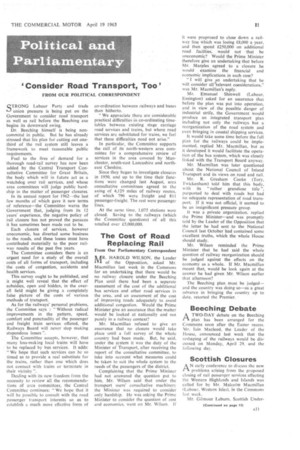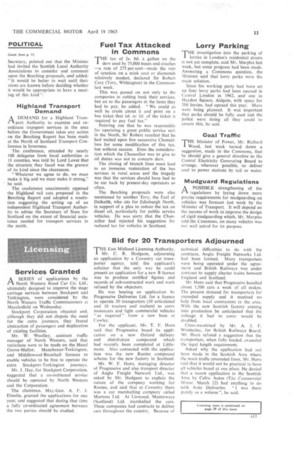The Cost of Road Replacing Rail
Page 13

Page 15

If you've noticed an error in this article please click here to report it so we can fix it.
From Our Parliamentary Correspondent
MR. HAROLD WILSON, the Leader of the Opposition, asked Mr. Macmillan last week in the Commons for an undertaking that there would be no railway closure under the Beeching Plan until there had been a separate assessment of the cost of the additional bus services and other road services in the area, and an assessment of the cost of improving roads adequately to avoid additional congestion. Would the Prime Minister give an assurance that the matter would be looked at nationally and not purely in a railway context?
Mr. Macmillan refused to give an assurance that no closure would take place until a full survey of the whole country had been made. But, he said, under the system it was the duty of the Minister of Transport, after receiving the report of the consultative committee, to take into account what measures could be taken to suit the whole system to the needs of the passengers of the district.
Complaining that the Prime Minister had not answered the question put to him, Mr. Wilson said that under the transport users' consultative machinery the Minister was required to consider only hardship. He was asking the Prime Minister to consider the question of cost and economics, went on Mr. Wilson. If
it were proproscd to close down a railway line which Was losing £8,000 a year, and then spend £250,000 on additional road facilties, would not that be uneconomic? Would the Prime Minister therefore give an undertaking that before Mr. Mar/31es agreed to a closure he would examine the financial and economic implications in each case?
"I will give an undertaking that he will consider all relevant considerations," was Mr. Macmillan's reply.
Mr. Emanuel Shinwell (Labour, Easington) asked for an assurance that before the plan was put into operation, and in view of the possible danger of industrial strife, the Government would produce an integrated transport plan including not only the railways but a reorganization of the road system and even bringing in coastal shipping services.
It would take some time before the full plan for the railways could be implemented, replied Mr. Macmillan, but as it developed it would facilitate the operation of the bus system, which was closely linked with the Transport Board anyway.
Mr. Macmillan was later questioned about the National Council of Inland Transport and its views on road and rail.
Mr. R. Gresham Cooke (Tory, Twickenham) told him that this body, with its "rather grandiose title purported to deal with roads but had no adequate representation of road transport. If it was not official, it seemed to be an insignificant pressure group.
It was a private organization, replied the Prime Minister—and was promptly told by the Leader of the Opposition that the letter he had sent to the National Council last October had contained some excellent truths, which the whole House should study.
Mr. Wilson reminded the Prime Minister that he bad said the whole question of railway reorganization should be judged against the effects on the economy as a whole. If Mr. Macmillan meant that, would he look again at the answer he had given Mr. Wilson earlier that afternoon?
The Beeching plan must be judged— and the country was doing so—as a great advance in bringing the country up to date, retorted the Premier.
Beeching Debate
PAA TWO-DAY debate on the Beeching plan has been arranged for the Commons soon after the Easter recess. Mr. lain Macleod, the Leader of the House, announced last week that the reshaping of the railways would be discussed on Monday, April 29, and the following day,
Scottish Closures
AN early conference to discuss the new problems arising from the proposed closing of rail passenger services affecting the Western Highlands and Islands was called for by Mr. Malcolm Macmillan (Labour, Western Isles), in the Commons last week.
Mr. Gilmour Leburn, Scottish Under Secretary, pointed out that the Minister had invited the Scottish Local Authority Associations to consider and comment upon the Beeching proposals, and added: " It would be better to wait until their views are known before deciding whether it would be appropriate to have a meeting of this kind "•
Highland Transport Demand ADEMAND for a Highland Trans
port Authority to examine and coordinate transport services in the area before the Government takes any action on the Beeching Report has been made at the North of Scotland Transport Conference in Inverness.
The conference, attended by nearly 100 delegates from local authorities in 11 counties, was told by Lord Lovat that the situation they faced was the gravest of its kind since the clearances.
" Whatever we agree to do, we must make it big and we must make it strong," he said.
The conference unanimously opposed the Highland rail cuts proposed in the Beeching Report and adopted a resolution suggesting the setting up of an independent Highland Transport Authority to advise the Secretary of State for Scotland on the extent of financial assistance needed for transport services in the north.




















































































































